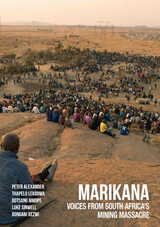
The Marikana Massacre of August 16, 2012, was the single most lethal use of force by South African security forces against civilians since the end of apartheid. Those killed were mineworkers in support of a pay raise. Through a series of interviews conducted with workers who survived the attack, this account documents and examines the controversial shootings in great detail, beginning with a valuable history of the events leading up to the killing of workers, and including eyewitness accounts of the violence and interviews with family members of those who perished.
While the official Farlam Commission investigation of the massacre is still ongoing, many South Africans do not hold much confidence in the government’s ability to examine its own complicity in these events. Marikana, on the other hand, examines the various roles played by the African National Congress, the mine company, and the National Union of Mineworkers in creating the conditions that led to the massacre. While the commission’s investigations take place in a courtroom setting tilted toward those in power, Marikana documents testimony from the mineworkers in the days before official statements were even gathered, offering an unusually immediate and unfiltered look at the reality from the perspective of those most directly affected. Enhanced by vivid maps that make clear the setting and situation of the events, Marikana is an invaluable work of history, journalism, sociology, and activism.


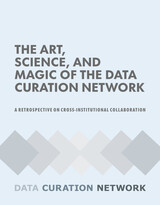
The Art, Science, and Magic of the Data Curation Network: A Retrospective on Cross Institutional Collaboration captures the results of a project retrospective meeting and describes the necessary components of the DCN’s sustained collaboration in the hopes that the insights will be of use to other collaborative efforts. In particular, the authors describe the successes of the community and challenges of launching a cross-institutional network. Additionally, this publication details the administrative, tool-based, and trust-based structures necessary for establishing this community, the “radical collaboration” that is the cornerstone of the DCN, and potential future collaborations to address shared challenges in libraries and research data management. This in-depth case study provides an overview of the critical work of launching a collaborative network and transitioning to sustainability. This publication will be of special interest to research librarians, data curators, and anyone interested in academic community building.
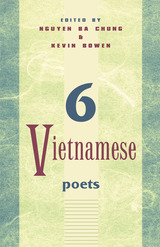
Speaking to the Heart
After a long night up writing poems,a streak of sunlight leapt into my room.
I ran to the yard,
running as if I were a child,
footprints breaking the earth's first dew,
chest brushing softly the short grass.
Earth and sky seeped into me like wine.
Startled,
I saw my heart in the shape of a ploughshare<
resting on the earth's shoulder,
the heart thumping, steadily ploughing into time.
—Lam Thi My Da
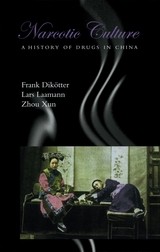
In a stunning historical reversal, Frank Dikötter, Lars Laamann, and Zhou Xun tell this different story of the relationship between opium and the Chinese. They reveal that opium actually had few harmful effects on either health or longevity; in fact, it was prepared and appreciated in highly complex rituals with inbuilt constraints preventing excessive use. Opium was even used as a medicinal panacea in China before the availability of aspirin and penicillin. But as a result of the British effort to eradicate opium, the Chinese turned from the relatively benign use of that drug to heroin, morphine, cocaine, and countless other psychoactive substances. Narcotic Culture provides abundant evidence that the transition from a tolerated opium culture to a system of prohibition produced a "cure" that was far worse than the disease.
Delving into a history of drugs and their abuses, Narcotic Culture is part revisionist history of imperial and twentieth-century Britain and part sobering portrait of the dangers of prohibition.

These clearly written and insightful essays address the roots of China's crisis. The authors focus on institutional changes necessary for a spontaneous market order and point to the close relation between economic reform and political-constitutional reform. Topics include the speed and degree of the transition, whether ownership reform must precede price reform, how inflation can be avoided, steps to depoliticize economic life, how to create an environment conducive to foreign trade and investment, and how to institute basic constitutional change and open China to the outside world.
The revolutionary changes now shaking the foundations of socialism and central planning in the Soviet Union and Eastern and Central Europe are sure to have an impact on China's future. Despite their seriousness, the events of Tiananmen Square may constitute only a temporary detour on the road toward a private market order. The essays in this volume help lay a rational framework for understanding China's present problems and for discussing the prospects for future reform.



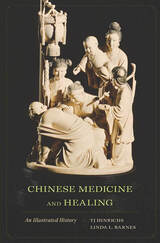
Chinese Medicine and Healing is a comprehensive introduction to a rich array of Chinese healing practices as they have developed through time and across cultures. Contributions from fifty-eight leading international scholars in such fields as Chinese archaeology, history, anthropology, religion, and medicine make this a collaborative work of uncommon intellectual synergy, and a vital new resource for anyone working in East Asian or world history, in medical history and anthropology, and in biomedicine and complementary healing arts.
This illustrated history explores the emergence and development of a wide range of health interventions, including propitiation of disease-inflicting spirits, divination, vitality-cultivating meditative disciplines, herbal remedies, pulse diagnosis, and acupuncture. The authors investigate processes that contribute to historical change, such as competition between different types of practitioner—shamans, Daoist priests, Buddhist monks, scholar physicians, and even government officials. Accompanying vignettes and illustrations bring to life such diverse arenas of health care as childbirth in the Tang period, Yuan state-established medical schools, fertility control in the Qing, and the search for sexual potency in the People’s Republic.
The two final chapters illustrate Chinese healing modalities across the globe and address the challenges they have posed as alternatives to biomedical standards of training and licensure. The discussion includes such far-reaching examples as Chinese treatments for diphtheria in colonial Australia and malaria in Africa, the invention of ear acupuncture by the French and its worldwide dissemination, and the varying applications of acupuncture from Germany to Argentina and Iraq.

Two racy Greek romances.
In Longus’ ravishing Daphnis and Chloe (second or early third century AD), one of the great works of world literature, an innocent boy and girl gradually discover their sexuality in an idealized pastoral environment. In Xenophon’s Anthia and Habrocomes (first century AD), perhaps the earliest extant novel and a new addition to the Loeb Classical Library, a newlywed couple, separated by mischance, survive hair-raising adventures and desperate escapes as they traverse the Mediterranean and the Near East en route to a joyful reunion. The pairing of these two novels well illustrates both the basic conventions of the genre and its creative range.
This new edition offers fresh translations and texts by Jeffrey Henderson, based on the recent critical editions of Longus by M. D. Reeve and Xenophon by J. N. O’Sullivan.

On Morals or Concerning Education is an exhortation on the importance of education by the prolific late-Byzantine author and statesman Theodore Metochites (1270–1332), who rose to the aristocracy from a middle-class background but fell from favor late in life and died as a monk. As a manual of proper living and ethical guidance, the treatise offers unique insights into the heightened roles of philosophy and rhetoric at a time when the elite engaged intensely with their Hellenic heritage, part of a larger imperial attempt to restore Byzantium to its former glories.
On Morals probes hotly disputed issues in fourteenth-century Byzantine society, such as the distinction between the active and contemplative life and the social position of scholars. Metochites’s focus on the character and function of Christian faith also reflects ongoing debates regarding the philosophy of religion. Occasional autobiographical digressions offer fascinating glimpses of Metochites’s distinctive personality.
This volume provides the full Byzantine Greek text alongside the first English translation of one of Metochites’s longest works.
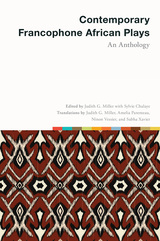
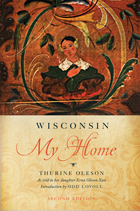



Like their Hollywood counterparts, Latin American film and TV melodramas have always been popular and highly profitable. The first of its kind, this anthology engages in a serious study of the aesthetics and cultural implications of Latin American melodramas. Written by some of the major figures in Latin American film scholarship, the studies range across seventy years of movies and television within a transnational context, focusing specifically on the period known as the "Golden Age" of melodrama, the impact of classic melodrama on later forms, and more contemporary forms of melodrama. An introductory essay examines current critical and theoretical debates on melodrama and places the essays within the context of Latin American film and media scholarship.
Contributors are Luisela Alvaray, Mariana Baltar, Catherine L. Benamou, Marvin D’Lugo, Paula Félix-Didier, Andrés Levinson, Gilberto Perez, Darlene J. Sadlier, Cid Vasconcelos, and Ismail Xavier.

A pioneering study of historical developments that have shaped Asia concludes with this volume tracing the impact of ideas and cultures of people on the move across the continent, whether willingly or not.
In the final volume of Asia Inside Out, a stellar interdisciplinary team of scholars considers the migration of people—and the ideas, practices, and things they brought with them—to show the ways in which itinerant groups have transformed their culture and surroundings. Going beyond time and place, which animated the first two books, this third one looks at human beings on the move.
Human movement from place to place across time reinforces older connections while forging new ones. Erik Harms turns to Vietnam to show that the notion of a homeland as a marked geographic space can remain important even if that space is not fixed in people’s lived experience. Angela Leung traces how much of East Asia was brought into a single medical sphere by traveling practitioners. Seema Alavi shows that the British preoccupation with the 1857 Indian Revolt allowed traders to turn the Omani capital into a thriving arms emporium. James Pickett exposes the darker side of mobility in a netherworld of refugees, political prisoners, and hostages circulating from the southern Russian Empire to the Indian subcontinent. Other authors trace the impact of movement on religious art, ethnic foods, and sports spectacles.
By stepping outside familiar categories and standard narratives, this remarkable series challenges us to rethink our conception of Asia in complex and nuanced ways.

In an era when half of marriages end in divorce, cohabitation has become more commonplace and those who do get married are doing so at an older age. So why do people marry when they do? And why do some couples choose to cohabit? A team of expert family sociologists examines these timely questions in Marriage and Cohabitation, the result of their research over the last decade on the issue of union formation.
Situating their argument in the context of the Western world’s 500-year history of marriage, the authors reveal what factors encourage marriage and cohabitation in a contemporary society where the end of adolescence is no longer signaled by entry into the marital home. While some people still choose to marry young, others elect to cohabit with varying degrees of commitment or intentions of eventual marriage. The authors’ controversial findings suggest that family history, religious affiliation, values, projected education, lifetime earnings, and career aspirations all tip the scales in favor of either cohabitation or marriage. This book lends new insight into young adult relationship patterns and will be of interest to sociologists, historians, and demographers alike.
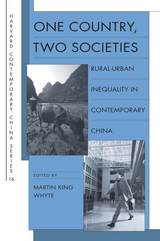
This timely and important collection of original essays analyzes China’s foremost social cleavage: the rural–urban gap. It is now clear that the Chinese communist revolution, though professing dedication to an egalitarian society, in practice created a rural order akin to serfdom, in which 80 percent of the population was effectively bound to the land. China is still struggling with that legacy. The reforms of 1978 changed basic aspects of economic and social life in China’s villages and cities and altered the nature of the rural-urban relationship. But some important institutions and practices have changed only marginally or not at all, and China is still sharply divided into rural and urban castes with different rights and opportunities in life, resulting in growing social tensions.
The contributors, many of whom conducted extensive fieldwork, examine the historical background of rural–urban relations; the size and trend in the income gap between rural and urban residents in recent years; aspects of inequality apart from income (access to education and medical care, the digital divide, housing quality and location); experiences of discrimination, particularly among urban migrants; and conceptual and policy debates in China regarding the status and treatment of rural residents and urban migrants.
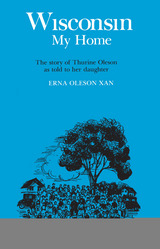


A continuation of Thucydides.
Xenophon (ca. 430 to ca. 354 BC) was a wealthy Athenian and friend of Socrates. He left Athens in 401 and joined an expedition including ten thousand Greeks led by the Persian governor Cyrus against the Persian king. After the defeat of Cyrus, it fell to Xenophon to lead the Greeks from the gates of Babylon back to the coast through inhospitable lands. Later he wrote the famous vivid account of this “March Up-Country” (Anabasis); but meanwhile he entered service under the Spartans against the Persian king, married happily, and joined the staff of the Spartan king, Agesilaus. But Athens was at war with Sparta in 394 and so exiled Xenophon. The Spartans gave him an estate near Elis where he lived for years writing and hunting and educating his sons. Reconciled to Sparta, Athens restored Xenophon to honor, but he preferred to retire to Corinth.
Xenophon’s Anabasis is a true story of remarkable adventures. Hellenica, a history of Greek affairs from 411 to 362, begins as a continuation of Thucydides’ account. There are four works on Socrates (collected in LCL 168). In Memorabilia Xenophon adds to Plato’s picture of Socrates from a different viewpoint. The Apology is an interesting complement to Plato’s account of Socrates’ defense at his trial. Xenophon’s Symposium portrays a dinner party at which Socrates speaks of love; and Oeconomicus has him giving advice on household management and married life. Cyropaedia, a historical romance on the education of Cyrus (the Elder), reflects Xenophon’s ideas about rulers and government; the Loeb edition is in two volumes.
We also have his Hiero, a dialogue on government; Agesilaus, in praise of that king; Constitution of Lacedaemon (on the Spartan system); Ways and Means (on the finances of Athens); Manual for a Cavalry Commander; a good manual of Horsemanship; and a lively Hunting with Hounds. The Constitution of the Athenians, though clearly not by Xenophon, is an interesting document on politics at Athens. These eight books are collected in the last of the seven volumes of the Loeb Classical Library edition of Xenophon.

A continuation of Thucydides.
Xenophon (ca. 430 to ca. 354 BC) was a wealthy Athenian and friend of Socrates. He left Athens in 401 and joined an expedition including ten thousand Greeks led by the Persian governor Cyrus against the Persian king. After the defeat of Cyrus, it fell to Xenophon to lead the Greeks from the gates of Babylon back to the coast through inhospitable lands. Later he wrote the famous vivid account of this “March Up-Country” (Anabasis); but meanwhile he entered service under the Spartans against the Persian king, married happily, and joined the staff of the Spartan king, Agesilaus. But Athens was at war with Sparta in 394 and so exiled Xenophon. The Spartans gave him an estate near Elis where he lived for years writing and hunting and educating his sons. Reconciled to Sparta, Athens restored Xenophon to honor, but he preferred to retire to Corinth.
Xenophon’s Anabasis is a true story of remarkable adventures. Hellenica, a history of Greek affairs from 411 to 362, begins as a continuation of Thucydides’ account. There are four works on Socrates (collected in LCL 168). In Memorabilia Xenophon adds to Plato’s picture of Socrates from a different viewpoint. The Apology is an interesting complement to Plato’s account of Socrates’ defense at his trial. Xenophon’s Symposium portrays a dinner party at which Socrates speaks of love; and Oeconomicus has him giving advice on household management and married life. Cyropaedia, a historical romance on the education of Cyrus (the Elder), reflects Xenophon’s ideas about rulers and government; the Loeb edition is in two volumes.
We also have his Hiero, a dialogue on government; Agesilaus, in praise of that king; Constitution of Lacedaemon (on the Spartan system); Ways and Means (on the finances of Athens); Manual for a Cavalry Commander; a good manual of Horsemanship; and a lively Hunting with Hounds. The Constitution of the Athenians, though clearly not by Xenophon, is an interesting document on politics at Athens. These eight books are collected in the last of the seven volumes of the Loeb Classical Library edition of Xenophon.

Greek mercenaries on the march.
Xenophon (ca. 430 to ca. 354 BC) was a wealthy Athenian and friend of Socrates. He left Athens in 401 and joined an expedition including ten thousand Greeks led by the Persian governor Cyrus against the Persian king. After the defeat of Cyrus, it fell to Xenophon to lead the Greeks from the gates of Babylon back to the coast through inhospitable lands. Later he wrote the famous vivid account of this “March Up-Country” (Anabasis); but meanwhile he entered service under the Spartans against the Persian king, married happily, and joined the staff of the Spartan king, Agesilaus. But Athens was at war with Sparta in 394 and so exiled Xenophon. The Spartans gave him an estate near Elis where he lived for years writing and hunting and educating his sons. Reconciled to Sparta, Athens restored Xenophon to honor, but he preferred to retire to Corinth.
Xenophon’s Anabasis is a true story of remarkable adventures. Hellenica, a history of Greek affairs from 411 to 362, begins as a continuation of Thucydides’ account. There are four works on Socrates (collected in LCL 168). In Memorabilia Xenophon adds to Plato’s picture of Socrates from a different viewpoint. The Apology is an interesting complement to Plato’s account of Socrates’ defense at his trial. Xenophon’s Symposium portrays a dinner party at which Socrates speaks of love; and Oeconomicus has him giving advice on household management and married life. Cyropaedia, a historical romance on the education of Cyrus (the Elder), reflects Xenophon’s ideas about rulers and government; the Loeb edition is in two volumes.
We also have his Hiero, a dialogue on government; Agesilaus, in praise of that king; Constitution of Lacedaemon (on the Spartan system); Ways and Means (on the finances of Athens); Manual for a Cavalry Commander; a good manual of Horsemanship; and a lively Hunting with Hounds. The Constitution of the Athenians, though clearly not by Xenophon, is an interesting document on politics at Athens. These eight books are collected in the last of the seven volumes of the Loeb Classical Library edition of Xenophon.

A miscellany of minor works.
Xenophon (ca. 430 to ca. 354 BC) was a wealthy Athenian and friend of Socrates. He left Athens in 401 and joined an expedition including ten thousand Greeks led by the Persian governor Cyrus against the Persian king. After the defeat of Cyrus, it fell to Xenophon to lead the Greeks from the gates of Babylon back to the coast through inhospitable lands. Later he wrote the famous vivid account of this “March Up-Country” (Anabasis); but meanwhile he entered service under the Spartans against the Persian king, married happily, and joined the staff of the Spartan king, Agesilaus. But Athens was at war with Sparta in 394 and so exiled Xenophon. The Spartans gave him an estate near Elis where he lived for years, writing and hunting and educating his sons. Reconciled to Sparta, Athens restored Xenophon to honor, but he preferred to retire to Corinth.
Xenophon’s Anabasis is a true story of remarkable adventures. Hellenica, a history of Greek affairs from 411 to 362, begins as a continuation of Thucydides’ account. There are four works on Socrates (collected in LCL 168). In Memorabilia Xenophon adds to Plato’s picture of Socrates from a different viewpoint. The Apology is an interesting complement to Plato’s account of Socrates’ defense at his trial. Xenophon’s Symposium portrays a dinner party at which Socrates speaks of love; and Oeconomicus has him giving advice on household management and married life. Cyropaedia, a historical romance on the education of Cyrus (the Elder), reflects Xenophon’s ideas about rulers and government.
We also have his Hiero, a dialogue on government; Agesilaus, in praise of that king; Constitution of Lacedaemon (on the Spartan system); Ways and Means (on the finances of Athens); Manual for a Cavalry Commander; a good manual of Horsemanship; and a lively Hunting with Hounds—mostly hare hunting. The Constitution of the Athenians, though clearly not by Xenophon, is an interesting document on politics at Athens. These eight books are collected in the present volume.


Socrates without Plato.
Xenophon (ca. 430 to ca. 354 BC), a member of a wealthy but politically quietist Athenian family and an admirer of Socrates, left Athens in 401 BC to serve as a mercenary commander for Cyrus the Younger of Persia, then joined the staff of King Agesilaus II of Sparta before settling in Elis and, in the aftermath of the battle of Leuctra in 371 BC, retiring to Corinth. His historical and biographical works, Socratic dialogues and reminiscences, and short treatises on hunting, horsemanship, economics, and the Spartan constitution are richly informative about his own life and times.
This volume collects Xenophon’s portrayals of his associate, Socrates. In Memorabilia (or Memoirs of Socrates) and in Oeconomicus, a dialogue about household management, we see the philosopher through Xenophon’s eyes. Here, as in the accompanying Symposium, we also obtain insight on life in Athens. The volume concludes with Xenophon’s Apology, an interesting complement to Plato’s account of Socrates’ defense at his trial.

A royal education.
Xenophon (ca. 430 to ca. 354 BC) was a wealthy Athenian and friend of Socrates. He left Athens in 401 and joined an expedition including ten thousand Greeks led by the Persian governor Cyrus against the Persian king. After the defeat of Cyrus, it fell to Xenophon to lead the Greeks from the gates of Babylon back to the coast through inhospitable lands. Later he wrote the famous vivid account of this “March Up-Country” (Anabasis); but meanwhile he entered service under the Spartans against the Persian king, married happily, and joined the staff of the Spartan king, Agesilaus. But Athens was at war with Sparta in 394 and so exiled Xenophon. The Spartans gave him an estate near Elis where he lived for years writing and hunting and educating his sons. Reconciled to Sparta, Athens restored Xenophon to honor, but he preferred to retire to Corinth.
Xenophon’s Anabasis is a true story of remarkable adventures. Hellenica, a history of Greek affairs from 411 to 362, begins as a continuation of Thucydides’ account. There are four works on Socrates (collected in LCL 168). In Memorabilia Xenophon adds to Plato’s picture of Socrates from a different viewpoint. The Apology is an interesting complement to Plato’s account of Socrates’ defense at his trial. Xenophon’s Symposium portrays a dinner party at which Socrates speaks of love; and Oeconomicus has him giving advice on household management and married life. Cyropaedia, a historical romance on the education of Cyrus (the Elder), reflects Xenophon’s ideas about rulers and government; the Loeb edition is in two volumes.
We also have his Hiero, a dialogue on government; Agesilaus, in praise of that king; Constitution of Lacedaemon (on the Spartan system); Ways and Means (on the finances of Athens); Manual for a Cavalry Commander; a good manual of Horsemanship; and a lively Hunting with Hounds. The Constitution of the Athenians, though clearly not by Xenophon, is an interesting document on politics at Athens. These eight books are collected in the last of the seven volumes of the Loeb Classical Library edition of Xenophon.

A royal education.
Xenophon (ca. 430 to ca. 354 BC) was a wealthy Athenian and friend of Socrates. He left Athens in 401 and joined an expedition including ten thousand Greeks led by the Persian governor Cyrus against the Persian king. After the defeat of Cyrus, it fell to Xenophon to lead the Greeks from the gates of Babylon back to the coast through inhospitable lands. Later he wrote the famous vivid account of this “March Up-Country” (Anabasis); but meanwhile he entered service under the Spartans against the Persian king, married happily, and joined the staff of the Spartan king, Agesilaus. But Athens was at war with Sparta in 394 and so exiled Xenophon. The Spartans gave him an estate near Elis where he lived for years writing and hunting and educating his sons. Reconciled to Sparta, Athens restored Xenophon to honor, but he preferred to retire to Corinth.
Xenophon’s Anabasis is a true story of remarkable adventures. Hellenica, a history of Greek affairs from 411 to 362, begins as a continuation of Thucydides’ account. There are four works on Socrates (collected in LCL 168). In Memorabilia Xenophon adds to Plato’s picture of Socrates from a different viewpoint. The Apology is an interesting complement to Plato’s account of Socrates’ defense at his trial. Xenophon’s Symposium portrays a dinner party at which Socrates speaks of love; and Oeconomicus has him giving advice on household management and married life. Cyropaedia, a historical romance on the education of Cyrus (the Elder), reflects Xenophon’s ideas about rulers and government; the Loeb edition is in two volumes.
We also have his Hiero, a dialogue on government; Agesilaus, in praise of that king; Constitution of Lacedaemon (on the Spartan system); Ways and Means (on the finances of Athens); Manual for a Cavalry Commander; a good manual of Horsemanship; and a lively Hunting with Hounds. The Constitution of the Athenians, though clearly not by Xenophon, is an interesting document on politics at Athens. These eight books are collected in the last of the seven volumes of the Loeb Classical Library edition of Xenophon.
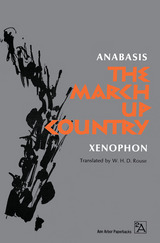
In 401 B.C. the Middle East was as much the center of the world attention as it is today. Ten thousand Greeks joined the army of Cyros marching on Babylon to overthrow the great King of the Persians, Artaxerxes. Among the Greeks was an Athenian gentleman, Xenophon, who went along as a sightseer but soon found himself cast in the main role.
At Cunaxa, Cyros' forces met and resoundingly defeated the tremendous army of the King, but Cyros was killed while leading the attack. Stranded a thousand miles from home, the Greeks chose Xenophon as their new leader. The wealthy Athenian squire rose to the challenge. Using every trick of the pioneer in hostile territory, he brought his men back to safety. The March Up Country is a classic of courage and adventure.
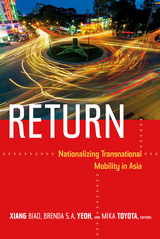
Contributors. Sylvia Cowan, Johan Lindquist, Melody Chia-wen Lu, Koji Sasaki, Shin Hyunjoon, Mariko Asano Tamanoi, Mika Toyota, Carol Upadhya, Wang Cangbai, Xiang Biao, Brenda S. A. Yeoh
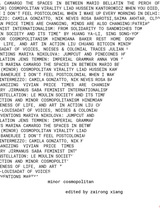
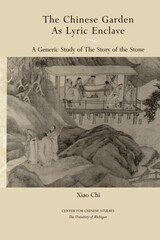

During China’s transition from dynastic empire to nation-state, the crowd emerged as a salient trope. Intellectuals across the ideological spectrum have used the crowd trope to ruminate on questions of selfhood and nationhood, and to advance competing models of enlightenment and revolution.
Revolutionary Waves analyzes the centrality of the crowd in the Chinese cultural and political imagination and its global resonances by delving into a wide range of fiction, philosophy, poetry, and psychological studies. Bringing together literary studies, intellectual history, critical theory, and the history of human sciences, this interdisciplinary work highlights unexplored interactions among emerging social-scientific forms of knowledge, new aesthetic modes of representation, and changing political imperatives. The work brings into relief the complexities of the modern Chinese crowd discourse, which generated subjectivities and oriented actions, enabled as well as constrained the expression of togetherness, and thus both expanded and limited the horizon of political possibilities in the emerging age of mass politics.
The first in-depth examination of the aesthetics and politics of the crowd in modern Chinese literature and thought, Revolutionary Waves raises questions about the promise and peril of community as communion and reimagines collective life in China’s post-socialist present.

At the chapbook's center are two long poems, titled "Phnom Penh Diptych: Wet Season" and "Phnom Penh Diptych: Dry Season," that examine the escapist narratives that draw tourists and expatriates to Cambodia, and the speaker’s own privileged positioning.
On a formal level, the poems in Nowhere to Arrive make room for the unsaid and that which cannot be articulated. Here, we have a vocabulary of silence alongside stark imagistic juxtapositions, poems that celebrate compression and the force of paratactic constructions. Attentiveness and concentration emerge as virtues, as the speaker surveys the vast territory of the present with a wakeful gaze.

Xiao Hong, Yom Sang-sop, Abe Kobo, and Zhong Lihe—these iconic literary figures from China, Korea, Japan, and Taiwan all described Manchuria extensively in their literary works. Now China’s Northeast but a contested frontier in the first half of the twentieth century, Manchuria has inspired writers from all over East Asia to claim it as their own, employing novel themes and forms for engaging nation and empire in modern literature. Many of these works have been canonized as quintessential examples of national or nationalist literature—even though they also problematize the imagined boundedness and homogeneity of nation and national literature at its core.
Through the theoretical lens of literary territorialization, Miya Xie reconceptualizes modern Manchuria as a critical site for making and unmaking national literatures in East Asia. Xie ventures into hitherto uncharted territory by comparing East Asian literatures in three different languages and analyzing their close connections in the transnational frontier. By revealing how writers of different nationalities constantly enlisted transnational elements within a nation-centered body of literature, Territorializing Manchuria uncovers a history of literary co-formation at the very site of division and may offer insights for future reconciliation in the region.
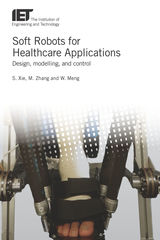

Alarmists argue that the United States urgently needs more and better-trained scientists to compete with the rest of the world. Their critics counter that, far from facing a shortage, we are producing a glut of young scientists with poor employment prospects. Both camps have issued reports in recent years that predict the looming decline of American science. Drawing on their extensive analysis of national data sets, Yu Xie and Alexandra Killewald have welcome news to share: American science is in good health.
Is American Science in Decline? does reveal areas of concern, namely scientists’ low earnings, the increasing competition they face from Asia, and the declining number of doctorates who secure academic positions. But the authors argue that the values inherent in American culture make the country highly conducive to science for the foreseeable future. They do not see globalization as a threat but rather a potential benefit, since it promotes efficiency in science through knowledge-sharing. In an age when other countries are catching up, American science will inevitably become less dominant, even though it is not in decline relative to its own past. As technology continues to change the American economy, better-educated workers with a range of skills will be in demand. So as a matter of policy, the authors urge that science education not be detached from general education.

Why do so few women choose a career in science--even as they move into medicine and law in ever-greater numbers? In one of the most comprehensive studies of gender differences in science careers ever conducted, Women in Science provides a systematic account of how U.S. youth are selected into and out of science education in early life, and how social forces affect career outcomes later in the science labor market.
Studying the science career trajectory in its entirety, the authors attend to the causal influences of prior experiences on career outcomes as well as the interactions of multiple life domains such as career and family. While attesting to the progress of women in science, the book also reveals continuing gender differences in mathematics and science education and in the progress and outcomes of scientists' careers. The authors explore the extent and causes of gender differences in undergraduate and graduate science education, in scientists' geographic mobility, in research productivity, in promotion rates and earnings, and in the experience of immigrant scientists. They conclude that the gender gap in parenting responsibilities is a critical barrier to the further advancement of women in science.
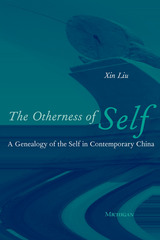


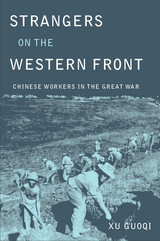
During World War I, Britain and France imported workers from their colonies to labor behind the front lines. The single largest group of support labor came not from imperial colonies, however, but from China. Xu Guoqi tells the remarkable story of the 140,000 Chinese men recruited for the Allied war effort.
These laborers, mostly illiterate peasants from north China, came voluntarily and worked in Europe longer than any other group. Xu explores China’s reasons for sending its citizens to help the British and French (and, later, the Americans), the backgrounds of the workers, their difficult transit to Europe—across the Pacific, through Canada, and over the Atlantic—and their experiences with the Allied armies. It was the first encounter with Westerners for most of these Chinese peasants, and Xu also considers the story from their perspective: how they understood this distant war, the racism and suspicion they faced, and their attempts to hold on to their culture so far from home.
In recovering this fascinating lost story, Xu highlights the Chinese contribution to World War I and illuminates the essential role these unsung laborers played in modern China’s search for a new national identity on the global stage.
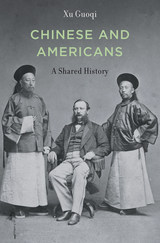
Chinese–American relations are often viewed through the prism of power rivalry and civilization clash. But China and America’s shared history is much more than a catalog of conflicts. Using culture rather than politics or economics as a reference point, Xu Guoqi highlights significant yet neglected cultural exchanges in which China and America have contributed to each other’s national development, building the foundation of what Zhou Enlai called a relationship of “equality and mutual benefit.”
Xu begins with the story of Anson Burlingame, Abraham Lincoln’s ambassador to China, and the 120 Chinese students he played a crucial role in bringing to America, inaugurating a program of Chinese international study that continues today. Such educational crosscurrents moved both ways, as is evident in Xu’s profile of the remarkable Ge Kunhua, the Chinese poet who helped spearhead Chinese language teaching in Boston in the 1870s. Xu examines the contributions of two American scholars to Chinese political and educational reform in the twentieth century: the law professor Frank Goodnow, who took part in making the Yuan Shikai government’s constitution; and the philosopher John Dewey, who helped promote Chinese modernization as a visiting scholar at Peking University and elsewhere. Xu also shows that it was Americans who first introduced to China the modern Olympic movement, and that China has used sports ever since to showcase its rise as a global power. These surprising shared traditions between two nations, Xu argues, provide the best roadmap for the future of Sino–American relations.
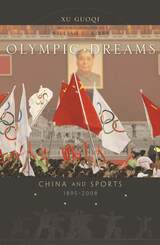
Already the world has seen the political, economic, and cultural significance of hosting the 2008 Olympics in Beijing—in policies instituted and altered, positions softened, projects undertaken. But will the Olympics make a lasting difference? This book approaches questions about the nature and future of China through the lens of sports—particularly as sports finds its utmost international expression in the Olympics.
Drawing on newly available archival sources to analyze a hundred-year perspective on sports in China, Olympic Dreams explores why the country became obsessed with Western sports at the turn of the twentieth century, and how it relates to China’s search for a national and international identity. Through case studies of ping-pong diplomacy and the Chinese handling of various sporting events, the book offers unexpected details and unusual insight into the patterns and processes of China’s foreign policymaking—insights that will help readers understand China’s interactions with the rest of the world.
Among the questions Xu Guoqi brings to the fore are: Why did Mao Zedong choose competitive ping-pong to manipulate world politics? How did the two-China issue nearly kill the 1976 Montreal Olympic Games? And why do the 2008 Olympics present Beijing with unprecedented dangers and opportunities? In exploring these questions, Xu brilliantly articulates a fresh and surprising perspective on China as an international sport superpower as well as a new “sick man of East Asia.” In Olympic Dreams, he presents an eloquent argument that in the deeply unsettled China of today, sport, as a focus of popular interest, has the capacity to bring about major social changes.

Drawing on his own experience as a teacher at Capital Normal University in Beijing, China during the 1980s, as well as exhaustive research, Luo Xu investigates the social and political climate of 1980s China in order to help better define the culture that ultimately drove the events at Tiananmen. Supporting his arguments with solid primary source documents, Xu contends that the contemplation of the meaning of life, along with other philosophical questions, were integral components of the general social crisis leading up to the movement of 1989.
Elegantly written and accessible to a general readership, this study will also be useful to specialists. Searching for Life's Meaning is a concise but detailed introduction to the mentalities of the Chinese generation presently assuming leadership in China. It should be valuable reading in courses on Chinese history and politics, and will be of interest to scholars in the related fields of Asian studies, anthropology, cultural studies, and youth studies. The book will also appeal to business- people and other professionals concerned with managing relations with the world's fastest growing polity.
Luo Xu is Assistant Professor of History, State University of New York College at Cortland.
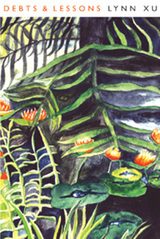


Through a close analysis of four cases from around the world, this book explores prejudice toward groups who are thought to have caused and spread COVID-19: the residents of Wuhan and Black African communities in China; ultra-Orthodox Jewish communities in the United States, United Kingdom, and Israel; African-Americans in the United States and Black/Asian/mixed ethnic communities in the United Kingdom; and White right-wing groups in the United States and Europe. The authors examine stereotyping and the false attribution of blame towards these groups, as well as what happens when a collective is actually at fault, and how the community deals with these conflicting issues.
This is a timely, cogent examination of the blame and xenophobia that have been brought to the surface by the COVID-19 pandemic.

Christina Xydias shows that some right-leaning parties advocate for women’s rights and interests, while left- and right-leaning parties can be equally indifferent to lack of representation for women from marginalized groups. These findings follow from analyses of election results, transcripts from debates and speeches, and personal interviews, as well as from a close reading of intertwined military and citizenship policies that illustrate how women’s and ethnic minority groups’ rights are constructed.
Beyond Left, Right, and Center concludes with an analysis of women’s representation across OECD countries, showing that right-leaning parties are more likely to support women’s rights and interests in societies that are more egalitarian.

READERS
Browse our collection.
PUBLISHERS
See BiblioVault's publisher services.
STUDENT SERVICES
Files for college accessibility offices.
UChicago Accessibility Resources
home | accessibility | search | about | contact us
BiblioVault ® 2001 - 2024
The University of Chicago Press









